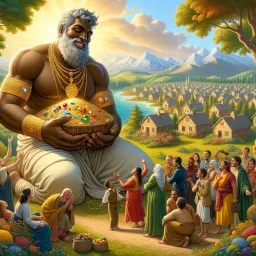”Love is composed of a single soul inhabiting two bodies“

0
0
0
0
- Meaning
- At its core, the phrase embodies the idea of deep, transformative love. It describes a state where two individuals share such an intimate bond that they effectively become one. This notion underscores the unity and mutual understanding that characterizes ideal love, implying it transcends mere physical presence to establish a spiritual connection.
- Allegory
- This image uses two semi-transparent, intertwined figures to represent the fusion of two souls into one. The serene ethereal landscape with floating lights and mist signifies the spiritual realm, implying the idea transcends physical reality. The shared, radiant heart symbolizes the emotional and spiritual core connecting the two bodies, while their expressions of calm joy illustrate understanding and unity. The entire composition aims to reflect the profound concept of love as a single soul inhabiting two bodies, underscoring its transcendent and unifying nature.
- Applicability
- In personal life, this idea can help couples strive for deeper emotional and spiritual connections. It emphasizes the importance of empathy, mutual respect, and a sense of shared purpose. Following this ideal can inspire partners to work towards truly understanding and supporting each other as if they were two halves of a whole.
- Impact
- This phrase has had a lasting impact on how love is conceptualized in Western culture. It romanticizes the idea of soulmate, which is a common theme in literature, art, and popular culture. It fosters an ideal where love is seen as a transcendent and unifying force, encouraging people to seek deep, meaningful connections.
- Historical Context
- Though the phrase is often linked to Aristotle, it doesn't directly appear in his surviving works. If it does derive from his thoughts, it would likely come from the context of his exploration of ethics, relationships, and the nature of the human soul in works such as the "Nicomachean Ethics." Ancient Greece, known for its philosophical advancements, is a plausible time frame for its origin.
- Criticisms
- Critics might argue that this idealized view of love sets unrealistic expectations for relationships. It might lead individuals to believe that true love should feel effortless and spiritually profound at all times, neglecting the practical and often challenging work required to maintain a relationship. Additionally, not everyone subscribes to the belief in a 'soulmate,' and suggesting otherwise might exclude other valid forms of love and connection.
- Variations
- Variations of this concept can be found in many traditions and cultures. For example, in Hindu philosophy, the notion of 'Ardhanarishvara' where God is depicted as half-male and half-female signifies complete unity in duality. Similar views appear in Chinese mythology with Yin and Yang, representing interdependent dual forces.
-

Real knowledge is to know the extent of one's ignorance.
-

Do not impose on others what you do not wish for yourself.
-

To live in hearts we leave behind is not to die.
-

Love is a force that transforms and improves the Soul of the World.
-

He who fights with monsters should be careful lest he thereby become a monster.
-

We make a living by what we get, but we make a life by what we give.
-

It is better to be feared than loved, if you cannot be both.
-

Jealousy is the grave of affection.
-

It is in giving that we receive.
-

The more I learn, the more I realize how much I don't know.
No Comments